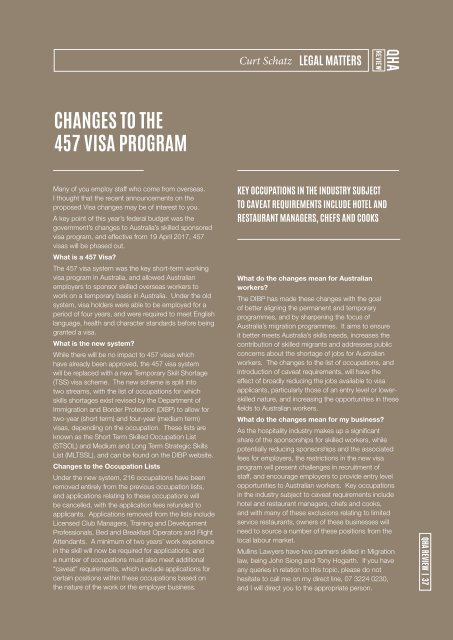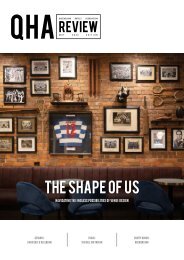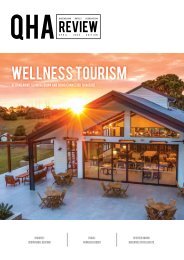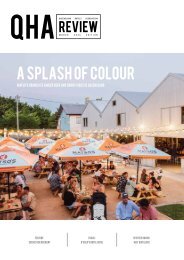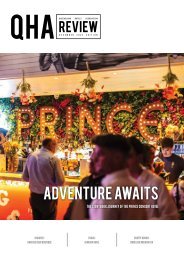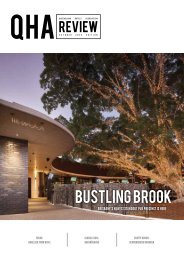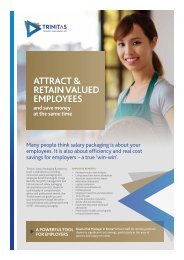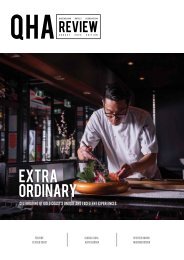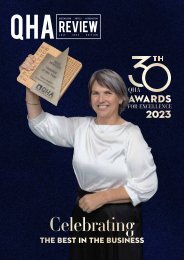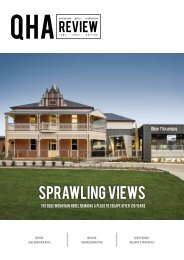QHA REVIEW June_2017
Create successful ePaper yourself
Turn your PDF publications into a flip-book with our unique Google optimized e-Paper software.
Curt Schatz<br />
LEGAL MATTERS<br />
CHANGES TO THE<br />
457 VISA PROGRAM<br />
Many of you employ staff who come from overseas.<br />
I thought that the recent announcements on the<br />
proposed Visa changes may be of interest to you.<br />
A key point of this year’s federal budget was the<br />
government’s changes to Australia’s skilled sponsored<br />
visa program, and effective from 19 April <strong>2017</strong>, 457<br />
visas will be phased out.<br />
What is a 457 Visa?<br />
The 457 visa system was the key short-term working<br />
visa program in Australia, and allowed Australian<br />
employers to sponsor skilled overseas workers to<br />
work on a temporary basis in Australia. Under the old<br />
system, visa holders were able to be employed for a<br />
period of four years, and were required to meet English<br />
language, health and character standards before being<br />
granted a visa.<br />
What is the new system?<br />
While there will be no impact to 457 visas which<br />
have already been approved, the 457 visa system<br />
will be replaced with a new Temporary Skill Shortage<br />
(TSS) visa scheme. The new scheme is split into<br />
two streams, with the list of occupations for which<br />
skills shortages exist revised by the Department of<br />
Immigration and Border Protection (DIBP) to allow for<br />
two-year (short term) and four-year (medium term)<br />
visas, depending on the occupation. These lists are<br />
known as the Short Term Skilled Occupation List<br />
(STSOL) and Medium and Long Term Strategic Skills<br />
List (MLTSSL), and can be found on the DIBP website.<br />
Changes to the Occupation Lists<br />
Under the new system, 216 occupations have been<br />
removed entirely from the previous occupation lists,<br />
and applications relating to these occupations will<br />
be cancelled, with the application fees refunded to<br />
applicants. Applications removed from the lists include<br />
Licensed Club Managers, Training and Development<br />
Professionals, Bed and Breakfast Operators and Flight<br />
Attendants. A minimum of two years’ work experience<br />
in the skill will now be required for applications, and<br />
a number of occupations must also meet additional<br />
“caveat” requirements, which exclude applications for<br />
certain positions within these occupations based on<br />
the nature of the work or the employer business.<br />
KEY OCCUPATIONS IN THE INDUSTRY SUBJECT<br />
TO CAVEAT REQUIREMENTS INCLUDE HOTEL AND<br />
RESTAURANT MANAGERS, CHEFS AND COOKS<br />
What do the changes mean for Australian<br />
workers?<br />
The DIBP has made these changes with the goal<br />
of better aligning the permanent and temporary<br />
programmes, and by sharpening the focus of<br />
Australia’s migration programmes. It aims to ensure<br />
it better meets Australia’s skills needs, increases the<br />
contribution of skilled migrants and addresses public<br />
concerns about the shortage of jobs for Australian<br />
workers. The changes to the list of occupations, and<br />
introduction of caveat requirements, will have the<br />
effect of broadly reducing the jobs available to visa<br />
applicants, particularly those of an entry level or lowerskilled<br />
nature, and increasing the opportunities in these<br />
fields to Australian workers.<br />
What do the changes mean for my business?<br />
As the hospitality industry makes up a significant<br />
share of the sponsorships for skilled workers, while<br />
potentially reducing sponsorships and the associated<br />
fees for employers, the restrictions in the new visa<br />
program will present challenges in recruitment of<br />
staff, and encourage employers to provide entry level<br />
opportunities to Australian workers. Key occupations<br />
in the industry subject to caveat requirements include<br />
hotel and restaurant managers, chefs and cooks,<br />
and with many of these exclusions relating to limited<br />
service restaurants, owners of these businesses will<br />
need to source a number of these positions from the<br />
local labour market.<br />
Mullins Lawyers have two partners skilled in Migration<br />
law, being John Siong and Tony Hogarth. If you have<br />
any queries in relation to this topic, please do not<br />
hesitate to call me on my direct line, 07 3224 0230,<br />
and I will direct you to the appropriate person.<br />
<strong>QHA</strong> <strong>REVIEW</strong> | 37


